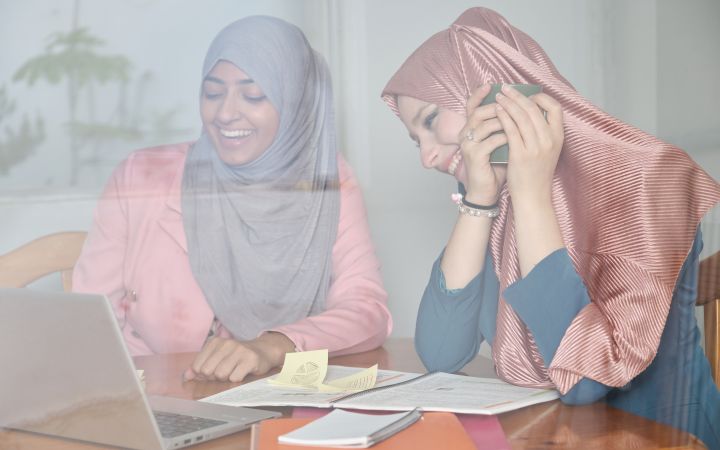- UNITAR alumna Karmen Chebib is Head of the Information and Public Relations Unit at the Center for Educational Research and Development, Ministry of Education and Higher Education in Lebanon.
- Karmen Chebib recently completed UNITAR's Gender Equality and Women’s Empowerment (GEWE) training programme.
- Before the COVID-19 pandemic, Karmen led her unit in training teachers on how to counteract gender stereotypes and encountered all kinds of attitudes and practices.
- Karmen is applying what she learned in the programme to her work. In her organization, she developed a proposal for a gender-related project using the structured approach taught in the GEWE programme.
28 November 2023, Hiroshima, Japan – UNITAR alumna Karmen Chebib is Head of the Information and Public Relations Unit at the Center for Educational Research and Development, Ministry of Education and Higher Education in Lebanon. Through education, she works to dismantle entrenched gender stereotypes that keep women and girls behind.
For the past three years, Karmen has been journeying with UNITAR in the Gender Equality and Women’s Empowerment (GEWE) training programme. This programme gave Karmen valuable insights and renewed inspiration to address the multifaceted challenges faced by women and girls in Lebanon.
CHALENGING ENTRENCHED VALUES IN A LAND OF DIVERSE COMMUNITIES
Lebanese women and girls find themselves navigating a societal landscape of deeply entrenched gender stereotypes – values that vary widely by region. Karmen points out that even teachers perpetuate bias. Before the COVID-19 pandemic, Karmen led her unit in training teachers on how to counteract gender stereotypes and encountered all kinds of attitudes and practices. In some places, girls were married off at an early age. Women were denied their inheritance, and violence against women was condoned.
Karmen tries to change such views by giving concrete local examples and by questioning the values.
I give them examples from that community because I know – it's my country. When someone told me ‘It's okay if I don't get an inheritance from my parents’, I said ‘Why?’"
While Lebanon’s cultural and religious diversity makes it challenging to tailor effective interventions for each community, and despite Lebanon’s serious economic crises, the influx of refugees and volatility in the Middle East, Karmen stresses the urgent need to address gender-based violence and elevate awareness to foster a more equitable society.
UNITAR GEWE Programme
Karmen assumed the role of the gender focal point for her department in 2012 and was nominated to join the first phase of the UNITAR GEWE programme in 2021. Through the programme, Karmen hoped to broaden her knowledge and gain fresh perspectives on addressing the complex challenges related to gender.
The UNITAR GEWE programme was launched in 2021 with the support of the Cypriot Government and UN Women. It aimed to build the capacity of government officials responsible for gender issues in Jordan, Iraq, and Lebanon so that they could better develop and implement their respective national action plans for gender equality.
The programme was extended to phase two in 2022 and phase three in 2023.
A NEW IDEA OF LEADERSHIP
The GEWE programme equipped Karmen with tools and methodologies to help her in her gender equality work. Karmen was especially struck by the idea that leadership intersected gender. It was a perspective that she had not considered before.
A lot of times we don’t recognize like, ‘Oh, actually, in my own way, I am making change, I am teaching other people something’. And so it's very good to have that changing insight.” —Karmen Chebib, Head of the Information and Public Relations Unit, Center for Educational Research and Development, Ministry of Education and Higher Education, Lebanon
She cherishes the diverse perspectives shared by participants hailing from Jordan, Iraq, and Lebanon which fostered a rich exchange of experiences and strategies that enhanced her approach to advocacy.
Karmen is applying what she learned in the programme to her work. In her organization, she developed a proposal for a gender-related project using the structured approach taught in the GEWE programme. She also used gender budgeting, a new concept for her.
While she awaits approval for her project, Karmen remains optimistic about the positive impact this initiative could have on dismantling gender barriers in the education sector. She also hopes to resume the teacher training on gender.
Looking ahead, Karmen hopes to delve deeper into gender studies. Her long-term aspirations include pursuing an advanced degree in gender, especially to explore gender from a Lebanese perspective and contribute valuable localized research.
MESSAGE TO WOMEN
Karmen urges fellow professionals and women working for women’s empowerment to actively embrace training opportunities and become advocates. She underscores the power of collective efforts in challenging stereotypes, breaking down barriers and creating a more inclusive and equal society that benefits everyone.
Karmen’s commitment serves as a call for a more equitable and just society and reminds us all of the power each individual holds to make a meaningful difference.
ABOUT UNITAR
The United Nations Institute for Training and Research (UNITAR) is a dedicated training arm of the United Nations. In 2022, UNITAR trained over 395,000 learners around the world to support their actions for a better future. In addition to our headquarters in Geneva, we have offices in Hiroshima, New York and Bonn and networks around the world.
The Division for Prosperity is based in the Hiroshima Office and Geneva. We seek to shape an inclusive, sustainable and prosperous world through world-class learning and knowledge-sharing services on entrepreneurship, leadership, finance and trade, digital technologies, and nuclear disarmament and non-proliferation. We empower individuals from least-developed countries, countries emerging from conflict, and small-island developing states – especially women and young people – to bring about positive change.
United Nations Online Volunteer Emily Ekshian contributed to this article.


